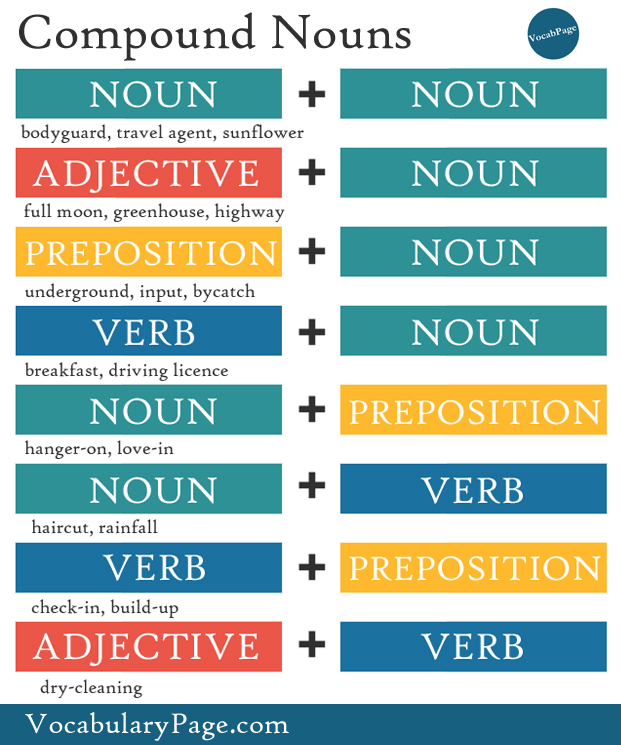

Understanding Compound Nouns: A Deep Dive Into Their Usage And Importance
Compound nouns are fascinating linguistic constructs that combine two or more words to create a new meaning. These unique formations enhance our language by providing specificity and clarity. The exploration of compound nouns, particularly the structure of noun-noun compounds, opens up a world of understanding in English vocabulary. In this article, we will delve into the intricacies of compound nouns, their types, examples, and their significance in effective communication.
Before we dive into the details, it's essential to recognize the role compound nouns play in our everyday language. They not only enrich our vocabulary but also allow us to convey complex ideas succinctly. This article aims to equip you with the knowledge to identify, use, and appreciate compound nouns, especially those formed by combining nouns with nouns.
As we navigate through the nuances of compound nouns, we will provide valuable insights, practical examples, and tips for incorporating them into your writing and speech. Whether you are a student, a professional, or simply a language enthusiast, this comprehensive guide will enhance your understanding and appreciation of compound nouns.
Table of Contents
- 1. What are Compound Nouns?
- 2. Types of Compound Nouns
- 3. Noun-Noun Compound Nouns
- 4. Examples of Noun-Noun Compound Nouns
- 5. How to Form Noun-Noun Compound Nouns
- 6. Usage of Compound Nouns in Sentences
- 7. The Importance of Understanding Compound Nouns
- 8. Conclusion
1. What are Compound Nouns?
Compound nouns are words that are made up of two or more nouns combined to form a new word with a specific meaning. They can be written as separate words, hyphenated, or combined into one word. The meaning of the compound noun often relates to the meanings of the individual nouns involved.
2. Types of Compound Nouns
Compound nouns can be classified into three main types:
- Closed Compound Nouns: These are written as one word (e.g., toothpaste, basketball).
- Hyphenated Compound Nouns: These are connected by a hyphen (e.g., mother-in-law, editor-in-chief).
- Open Compound Nouns: These are two separate words (e.g., coffee cup, swimming pool).
3. Noun-Noun Compound Nouns
Noun-noun compound nouns are a specific type of compound noun where two nouns are combined to create a new noun. This structure is prevalent in English and is used to convey more detailed meanings.
Examples of noun-noun compounds include:
- Toothbrush (tooth + brush)
- Football (foot + ball)
- Carpet cleaner (carpet + cleaner)
4. Examples of Noun-Noun Compound Nouns
Here are some additional examples of noun-noun compound nouns:
- Housekeeper (house + keeper)
- Sunflower (sun + flower)
- Firefighter (fire + fighter)
5. How to Form Noun-Noun Compound Nouns
Forming noun-noun compound nouns typically follows a straightforward process:
- Identify two nouns that represent a specific concept or object.
- Determine the order of the nouns based on which noun is more dominant or descriptive.
- Combine the nouns using the appropriate form (closed, hyphenated, or open).
6. Usage of Compound Nouns in Sentences
Using compound nouns in sentences enhances clarity and precision. Here are some examples:
- I bought a new toothbrush for my dental hygiene.
- She loves to play football on weekends.
- The housekeeper arrived early to clean the house.
7. The Importance of Understanding Compound Nouns
Understanding compound nouns is crucial for effective communication. They help convey complex ideas succinctly and enrich our vocabulary. Additionally, proficiency in using compound nouns can enhance writing and speaking skills, making one more articulate and expressive.
8. Conclusion
In conclusion, compound nouns, particularly noun-noun compounds, play a vital role in the English language. They not only enhance our vocabulary but also improve our ability to communicate effectively. Understanding how to use and form compound nouns can significantly elevate your language skills. We encourage you to experiment with compound nouns in your writing and speech to see their impact firsthand.
We invite you to leave a comment sharing your thoughts on compound nouns, ask any questions, or share this article with friends who might benefit from it. Explore more articles on our site to further enhance your understanding of language.
Thank you for reading, and we look forward to seeing you again soon!
You Also Like
When Were Seat Belts Invented: A Comprehensive HistoryThe Pirate Bay: A Deep Dive Into The Controversial Torrenting Platform
How To Put Zipper Back On Jacket: A Step-by-Step Guide
Wendy Williams And Puff Daddy: A Deep Dive Into Their Relationship And Careers
December 19 Zodiac Sign Compatibility: Understanding The Astrological Connections



